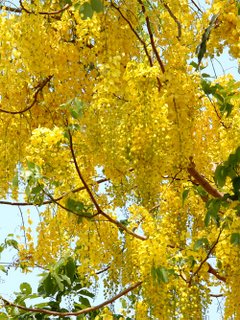“Auntie” Som pulls up a stool in the front stoop of her home. “Sorry about the mosquitoes,” she says. “At night there are so many! They get fat eating while we’re sleeping!” Flashing her tired toothless grin, she wipes her hands on her
Pokémon apron and gestures inside. “Last year the roof was full of rats, but it seems they’ve found a better home now!” Again that grin.
Auntie is one of Bangkok’s countless food vendors, and a glance inside makes it plain to see. The small, dark room she rents for herself and her granddaughter is piled high with cooking supplies: oil for deep-frying the battered banana tidbits she sells, sweet and spicy sauces to serve with the
satay pork skewers, lifters and strainers and stacks and stacks of dishes… All of which she hauls daily to a busy street-corner just beyond the corrugated tin fence so commonly used to separate slum-dwellings like hers from public space. Out there under the ubiquitous coca-cola umbrellas, the steady scream of passing traffic makes it hard to chat; hence the invite back home.
She has a bit of a limp because she lost a couple toes in an accident not long ago, but the walk isn’t far. It’s here we await the after-school return of her granddaughter, Yin, who is part of the child sponsorship program. But it’s a Friday afternoon, and Yin appears to be having fun somewhere! Nearly finished grade five, she’s an energetic tomboy unafraid to join in on rowdy matches of soccer, handball, even
takraaw – an acrobatic no-hands version of something like volleyball. Just as we’re regretfully eyeing the traffic jams, thinking we should start heading off, Yin saunters in off the falling-apart sidewalk, hair in a hurried ponytail, shirt disheveled and untucked from her pleated schoolgirl skirt.
Yin is happy to see Mac, the child sponsorship field worker. She gives him a casual wai, laughing easily like her grandmother as she explains that her marks in science and math aren’t so good, but otherwise she’s doing okay. Her voice is clear and strong, and she comfortably cracks her knuckles while we talk, nodding, “Yeah!” to Mac’s query as to whether or not she’ll be at church on Sunday.
In reality, Yin has walked so much farther than just to and from school. Labeled as a “naughty girl” and foisted on her grandmother by the neglect of her mother, who works as a “contemporary employee” somewhere in Bangkok, she’s come such a long way. She still has a long way to go: odds are, she will be tempted by money and pressured family to quit school and work as a bar girl once she’s done grade nine, if not before. Auntie Som, her sole care-giver, is aging rapidly, and will need her support soon. Yin’s path is indeed a falling-down sidewalk.
Oh God our only path, grant that she continue the daily trek so safely, so confidently…

